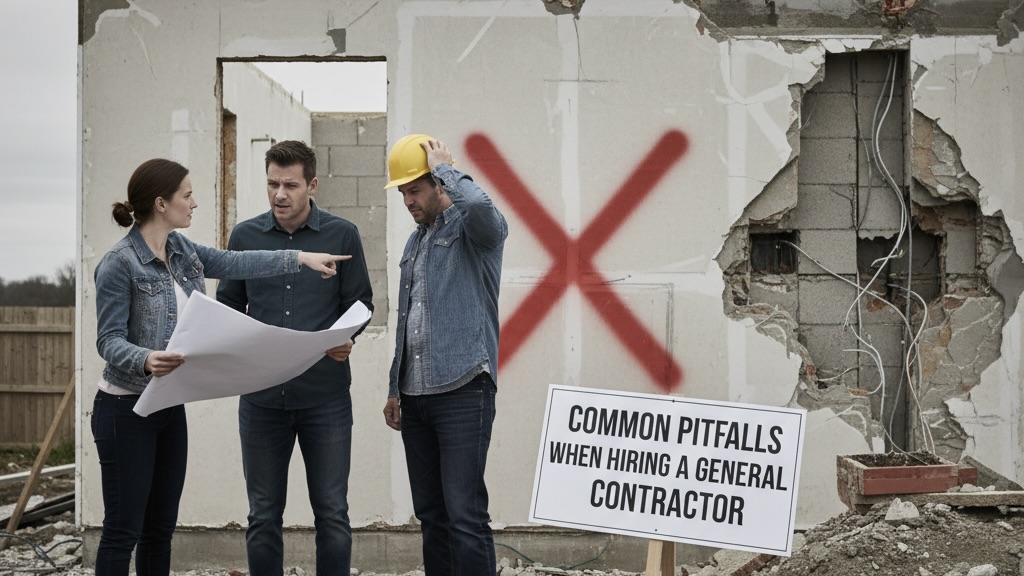September 30, 2025

The construction industry has a reputation—a not-so-glamorous one filled with delays, busted budgets, and some truly wild horror stories you could swap over a campfire. Hiring the right general contractor (GC) is essential if you want to bypass these headaches and ensure your project stays on track. However, finding “the one” can feel like navigating a minefield.
Whether you're an owner, construction manager, retailer, or developer, understanding potential pitfalls can save you a lot of grief—and even more money. Here's a breakdown of the most common traps people fall into when hiring a GC and how you can sidestep them like a pro.
1. Mistaking the Lowest Bid for the Best Option
Picture this: A contractor submits a bid that's almost too good to be true. Spoiler alert—it probably is.
Lowball bids are one of the oldest tricks in the book. A contractor might win your business with a rock-bottom price only to hit you with a barrage of change orders once the project begins. Suddenly, what seemed like the “budget-friendly” option costs more than the other bids you rejected.
Why does this happen? Often, it's due to aggressive cost-cutting. A general contractor might exclude necessary items that are missing on the plans, knowing they can charge for them later because they "aren't on the plans". Like floors don't always need to be level for new finishes. Everyone likes walking on a slant anyway.
Solution
Instead of focusing exclusively on upfront costs, request a detailed breakdown of their budget. Look for transparency in labor, materials, and contingencies. A higher bid from a reputable GC may save you more in the long run by avoiding time-consuming errors and inferior work.
2. Skipping the Homework on References and Reputation
Imagine hiring a GC based solely on their flashy website or smooth sales pitch. What could go wrong? Oh, only everything.
A contractor's website might showcase their best projects, but their reputation in the industry can tell a different story. Did their last client end up pulling their hair out over avoidable delays? Did the GC vanish mid-project, leaving an unfinished site that looks like a post-apocalyptic wasteland?
Solution
Request references and call former clients directly. Don’t be shy—ask tough questions about their experiences. Did the GC stick to the timeline and budget? How responsive were they when issues cropped up? And how did they handle the punch list at the end?
Insider tip: If a GC hesitates to provide references, consider it a red flag.
3. Overlooking Communication Red Flags
Poor communication has derailed more projects than bad weather and outdated blueprints combined. If your potential GC struggles to answer emails, is vague about timelines, or leaves you more confused after every conversation, you’re in trouble before you’ve even started.
The construction process is inherently complex. From permits to subcontractor coordination to client updates, a GC needs to operate like a general commanding troops. Clear, consistent communication is a non-negotiable skill. Without it, you’re left in the dark—and nothing good happens there.
Solution
Pay close attention during initial conversations. Are they proactive in addressing your concerns? Do they take the time to explain processes and next steps? If communication feels rocky early on, it will only get worse when the stakes are higher.
4. Underestimating the Importance of a Detailed Contract
You know the saying, “The devil is in the details”? Nowhere is that truer than in construction contracts. A vague or overly simplistic agreement can lead to disputes faster than you can say “scope creep.”
Common issues include unclear project timelines, incomplete payment schedules, and failure to outline who’s responsible for what. Without everything written out in painstaking detail, you’re inviting unnecessary confusion and, quite frankly, disaster.
Solution
Work with your legal team to draft a comprehensive contract that spells out every detail, from the start date to the payment schedule to how change orders will be handled. A airtight agreement protects everyone and ensures oops-moments don’t turn into lawsuits.
5. Falling for the “Charm Offensive”
Everyone loves a slick-talking charmer, but when your GC’s charisma overshadows their competence, you’re setting yourself up for failure. Some contractors are masters at the initial pitch but crumble under the weight of actual project management.
Charisma doesn’t build buildings. Processes do. What separates the pros from the amateurs isn’t how much they can make you laugh over coffee; it’s how they handle real-world challenges like supply chain hiccups or unexpected zoning issues.
Solution
Evaluate their pitch critically. Are they giving you real solutions and details, or just telling you what you want to hear? Review their portfolio and, more importantly, dig into how they’ve handled tough situations in the past.
6. Not Vetting Subcontractors or Crews
Here’s a dirty little secret about construction projects—your GC probably isn’t doing most of the hands-on work. They coordinate teams of subcontractors to complete different aspects of the build. While this is normal, relying on untrained or unsupervised crews isn’t.
Skilled subcontractors make the difference between a building that stands the test of time and one that’s riddled with hefty maintnance costs later. If a GC doesn’t invest in the right people—or worse, doesn’t vet them—your project could turn into a case study for what not to do.
Solution
Ask about their subcontractor screening process. How do they select crews? What certifications or experience levels do they require? If a GC unclear, they might be prioritizing speed—or their margins—over quality.
7. Ignoring the Importance of Post-Project Support
Once the handshakes and ribbon-cutting photos are over, some GCs wash their hands and walk away—ignoring lingering punch list items or warranty commitments. Don’t assume your partnership ends the second the scaffolding comes down.
Quality contractors stand by their work and ensure everything functions as it should post-completion. The squeaky HVAC that wasn’t installed right? A good GC will address it immediately.
Solution
Discuss post-project support during negotiations. How long is their warranty? Will they address fixes quickly? Keep a record of these commitments in your contract—verbal promises don’t hold up when your conference room’s flooring starts buckling one month in.
Don’t Settle for Outdated Industry Practices
We get it—the construction industry’s quirks can be frustrating, if not downright comical at times. But by being proactive and working with the right people, you can avoid these pitfalls and ensure your project goes off without a hitch (or at least with fewer hitches).
At Outbidd, we’re here to help you select a reliable, trustworthy general contractors who knows what they’re doing—and know how to do it well. We’ve reimagined the selection process so you can make informed choices that lead to successful outcomes.
Avoid the headaches, skip the guesswork. Book a demo on our website at outbidd.com or reach out to us at [email protected]. It’s time to leave outdated practices behind and build better, together.

.png)
